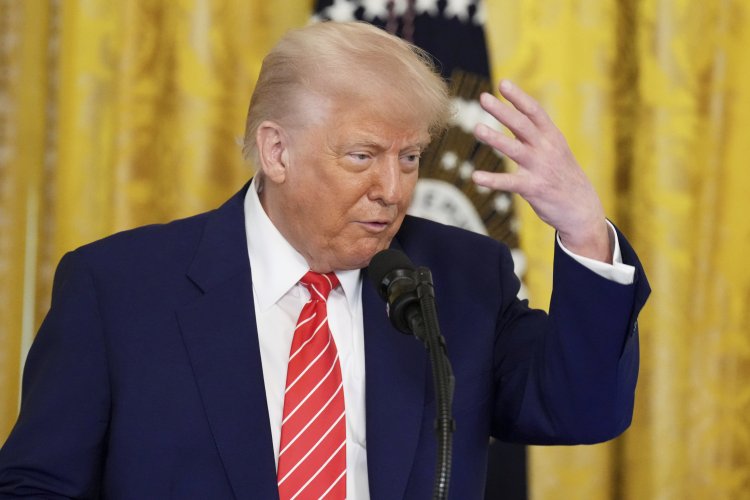Trump Dismisses Three Commissioners from Consumer Watchdog as He Deconstructs Agency
The Consumer Product Safety Commission, a relatively small yet influential federal agency, has spent fifty years ensuring that hazardous toys, cribs, and electronics do not reach American households.

On Thursday evening, the administration dismissed three commissioners appointed by President Biden from the five-member CPSC board—Alexander Hoehn-Saric, Mary T. Boyle, and Richard Trumka Jr. This move occurred mere hours before two staff members from the "Department of Government Efficiency" (DOGE) were set to meet with acting Chair Peter Feldman at the agency’s Bethesda headquarters, as reported by two individuals familiar with the meeting who spoke anonymously to avoid repercussions. Hoehn-Saric mentioned that although he received no direct communication from the White House, Feldman has prevented him from executing his duties.
The dismissed commissioners had opposed Feldman's efforts to officially bring on the DOGE staffers, according to Trumka Jr. "Rather than respect the democratic process, soon after, I received the email purporting to fire me," Trumka, son of the late labor leader Richard Trumka, stated, promising to file a lawsuit over his dismissal.
By mid-morning, the names of the fired commissioners were already removed from their office doors, as noted by a current staff member who requested anonymity for fear of retribution.
These firings follow the commissioners' resistance to any layoffs directed by DOGE and the reclassification of over 70 CPSC employees, including safety engineers, hazard analysts, and outreach personnel responsible for educating both manufacturers and consumers.
Boyle, Hoehn-Saric, and Trumka Jr. contended that the agency was already functioning under its approved staffing levels and that reductions would jeopardize essential safety efforts. "These terminations will inevitably result in emergency room visits or deaths that could and should have been avoided," Hoehn-Saric warned, having been appointed in 2021 and confirmed unanimously by the Senate.
The Trump administration is advancing a proposal to dissolve the CPSC as an independent entity and integrate its responsibilities into the Department of Health and Human Services (HHS), according to a proposed budget document obtained by PMG. The draft budget proposes establishing a new office within HHS, led by an "Assistant Secretary for Consumer Product Safety," that would "absorb functions and staff from the [CPSC]" while continuing the commission’s primary mission of safeguarding Americans from unreasonable risks of injury or death from consumer products. The new division is predicted to have an annual budget of $135 million, approximately 10 percent lower than its current funding of $151 million.
This plan necessitates approval from congressional appropriators and may face several legal challenges, given that the commission was instituted by statute.
The dismissals and the broader reorganization have incited a backlash from the commissioners, who assert that the administration is unlawfully dismantling a life-saving agency. "CPSC was created to be independent of the White House precisely so that decisions about public safety would not be subjected to political whims," Hoehn-Saric stated.
Boyle, who has worked at the CPSC for fifteen years as both a lawyer and senior official, described her termination as retaliatory for her refusal to "be complicit with the efforts of DOGE to destroy the agency." She expressed in a statement, "DOGE shows no respect for expertise, no respect for public servants, no respect for the citizens our government serves. Random layoffs with no rationale don’t reform government; they disable it."
White House press secretary Karoline Leavitt countered by telling PMG, "Is the federal agency within the executive branch? Who is the head of the executive branch? He has the right to fire people within the executive branch."
Both Boyle and Hoehn-Saric noted that the firing occurred just days after the Democratic commissioners voted to advance a proposed safety standard concerning lithium-ion batteries, linked to over 20 deadly fires involving e-bikes and e-scooters. This vote directly contradicted a Trump-era executive order that mandated White House review of all regulatory proposals—a directive the commissioners argue infringes upon their statutory independence. "We advanced the rule to gather public input, not implement it," Boyle explained. "That’s the process we’ve followed for decades. This administration wants to bury it behind closed doors."
Founded in the 1970s, the CPSC has always functioned as a discreet yet powerful agency that issues recalls, enforces safety regulations, and litigates against companies providing unsafe products. Such actions can severely damage businesses, and the agency has historically faced legal challenges from corporations like Amazon as well as conservative legal groups attempting to constrain its authority. Last fall, the Supreme Court declined to hear a petition that sought to undermine the CPSC by arguing that its insulation from presidential control violated the separation-of-powers clause.
Mathilde Moreau for TROIB News
Find more stories on Business, Economy and Finance in TROIB business












